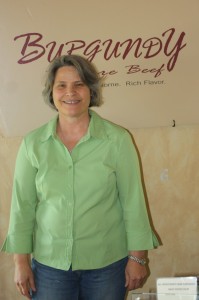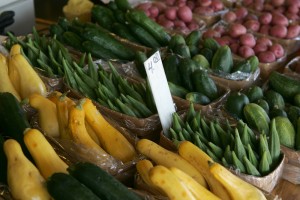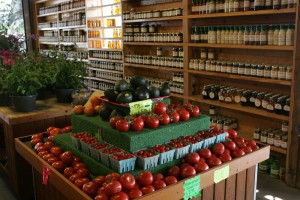The locavore movement is closely associated with organic and sustainable farming techniques. Many of the co-ops insist their suppliers use such techniques.
“We don’t deal with farms that have 100,000 birds shoved into a warehouse,” Birdsong said. “The farming techniques are all pasture-based and grass-based.”
The organic movement began in the early 1900s in response to the shift toward synthetic nitrogen fertilizers and pesticides in the early days of industrial agriculture but grew much stronger beginning in the early 2000s, because of books like Fast Food Nation that focus on the negative health effects of some foods.
For a product to be labeled organic, a farm must go through a long certification process that governs the production and handling of food. Many farmers and ranchers, such as the Taggarts, aren’t certified organic but use organic farming techniques.
Wendy Taggart said she and her husband chose not to try for the organic label because of all of the federal requirements.
“From a record-keeping standpoint, it’s overkill,” she said. “We’d have to get the ranch certified, the cattle, the butchering [operation]. We would have to pay more staff to keep all of those records.”
Though their ranch is not certified as organic, their cattle are certified as grass-fed and “no-antibiotic, no hormone.”
The “grass-fed” certification involved only their signed pledge. For the “no-antibiotic, no hormone” certification, the United States Department of Agriculture randomly tests the meat.
“We do say we ranch organically,” she said. “We don’t use chemicals or pesticides.”
On large industrial farms in the United States, where most of the country’s food animals are produced, antibiotics are routinely mixed with livestock feed, not to cure illness but to promote faster growth. Such practices promote the development of new and deadly strains of drug-resistant bacteria. Crowded and often unhygienic conditions on many industrial farms make the transfer of bacteria and infection more of a problem.

Over the past decade, everything from bird flu to mad cow disease have been traced back to industrial farms. Thousands of people get sick every day from food-borne illnesses due to farming practices.
“Sustainable” farming isn’t defined by regulations, but it refers to practices that protect the land and water from degradation, without constant addition of chemical fertilizers, weed killers, and pesticides.
The National Sustainable Agriculture Coalition lobbies federal and state governments for laws that will protect land from what they call irresponsible agricultural techniques.
********
Every other Saturday, about 20 people meet Birdsong to spend the morning sorting their Funky Farmz haul.
For Birdsong, connecting with like-minded people is one of the benefits of owning the food co-op.
Beyond the camaraderie, the co-op provides a way for them to eat healthily at a reasonable cost.
“There is definitely a cost advantage to the purchasing power of a co-op versus just walking into a grocery store and buying produce off the shelf,” Birdsong said. “We buy produce in bulk, and that savings is passed along.”
Another factor keeping the cost of membership low is that food co-ops like Funky Farmz don’t have any overhead, said Birdsong. “We don’t have stores to maintain, we don’t have electric bills to pay and things like that.”
Basic membership in Funky Farmz cost $30 a month, which buys enough produce to feed a family of four, but members pay only for the months when they participate. About 100 families belong. The group also offers other foods, like pasture-raised chickens and eggs, grass-fed beef, and pork, for additional fees.

Birdsong said she works with three farms regularly and buys from others as needed. She also buys from local artisans who make things like cheese, bread, and jams.
Birdsong personally selects the food items, using specific criteria for the group’s farming and artisan partners.
“We drive around to all of these farms or meet the farmers when they are in the area delivering,” she said. She does the legwork so the families don’t have to.
Both she and Grant of the Farm to Fork Co-op said they started their groups accidentally. Birdsong was disappointed with the quality of apples at her local grocery store. But she found that farmers would sell only in bulk, so she recruited some friends to go in with her. The idea expanded to other produce, meats, cheeses, and jams.
Grant’s desire for grass-fed beef spawned her co-op. She found a company that would deliver cuts of grass-fed beef to her home, but the minimum order was 20 pounds — too large an order for even her growing family. So she found a few friends who were also interested.
“After we started doing that, we decided we wanted to get chicken, and that supplier required a little bit larger of a minimum order,” she said. “So we reached out to more friends. And everything just kind of exploded from there.”
Now Farm to Fork has about 400 members, most of them recruited by friends.
Unlike Funky Farmz, Grant’s co-op doesn’t purchase produce. It mostly buys meat and fish and recently began to offer eggs and locally roasted coffee.
Neither co-op leader said they’re getting rich off the work. Birdsong said her markup is 25 percent, versus the 50 percent markup and distribution costs at grocery store chains. Though it’s turned into a full-time job, she said it’s more of a low-paying labor of love.
Grant said she makes enough to pay for her time, but her markup is similarly low.
“It’s making it worth it for us, but it’s not something that’s going to allow me to go out and buy a brand-new car next month,” she said.
********












